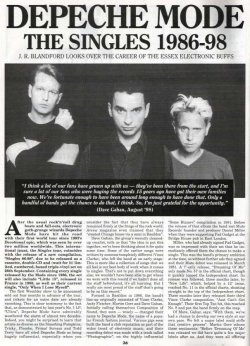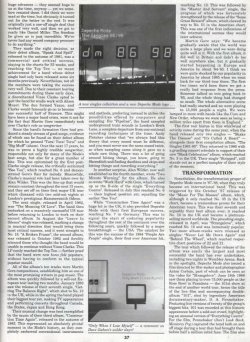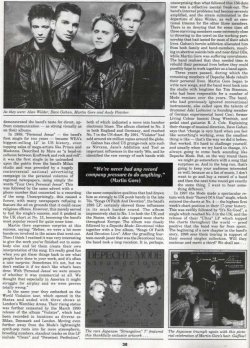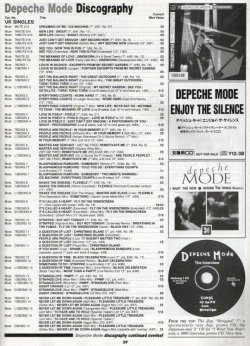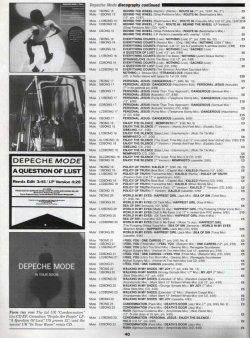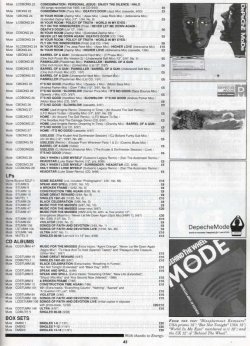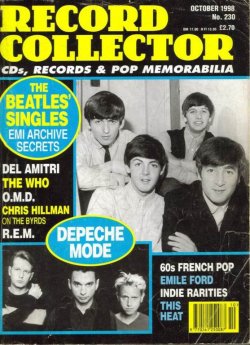You are using an out of date browser. It may not display this or other websites correctly.
You should upgrade or use an alternative browser.
You should upgrade or use an alternative browser.
Depeche Mode The Singles 1986-98 / Discography (Record Collector, 1998)
- Thread starter demoderus
- Start date
History of the band, with less of a rigid focus on the releases than Record Collector's 1989 article. Releases are looked at but this time in conjunction with the band's views on their development and changes of style over their career. A good detailed starting point for someone fairly new to the band. Also has a detailed discography (scanned, but not transcribed here).
" "We became gradually aware that the world was quite a large place and we were doing quite well in it.""
After the usual rock 'n' roll drug busts and fall-outs, electronic goth-grunge wizards Depeche Mode have hit the road with their first world tour since 1993's Devotional epic, which was seen by over two million worldwide. This international jaunt, the Singles tour, coincides with the release of a new compilation, "Singles 86>98", due to be released as a cassette, double-CD and (wait for it) limited, numbered, boxed triple-vinyl set on 28th September. Containing every single released by the Mode since 1986, the set will also include "Little 15", released in France in 1988, as well as their current single, "Only When I Lose Myself".
The first Wembley show to be announced sold out four months in advance of the tour, and tickets for an extra date are already vanishing. This is clear testimony to the fact that, as demonstrated by last year's No. 1 LP, "Ultra", Depeche Mode have admirably weathered the storm of almost two decades. Indeed, you might be surprised to learn that artists as diverse as the Smashing Pumpkins, Tricky, Placebo, Primal Scream and Todd Terry have all cited Depeche Mode as being hugely influential, especially when you consider the fact that they have always remained firmly at the fringe of the rock world. Arena magazine even claimed that they "created Chicago house via a semi in Basildon".
Dave Gahan, the group's recently cleaned-up vocalist, tells us that "the idea to put this together, we've been thinking about it for quite some time. Some of the earlier songs were written by someone completely different (Vince Clarke), who left the band at an early stage. This is more like a collection of songs that we all feel is our best body of work when it comes to singles. That's not to put down everything else; we wouldn't have been able to get where we were with this record if we hadn't done all the stuff beforehand, it's all learning. But I really am most proud of the stuff that's going to be on this record."
Formed in Basildon in 1980, the band's line-up originally consisted of Vince Clarke, Andy Fletcher, Martin Gore and Dave Gahan. Initially calling themselves Composition of Sound, they soon - wisely - changed their name to Depeche Mode, the name of a popular French fashion journal. Various gigs soon built the band a club reputation as part of the wider trend of electronic music, and their recording debut was made with a track called "Photographic", on the highly influential "Some Bizzare" compilation in 1981. Before the release of that album the band met Mute Records' founder and producer Daniel Miller when they were supporting Fad Gadget at the Bridge House pub in East London.
Miller, who had already signed Fad Gadget, was so impressed with their set that he immediately offered them the chance to make a single. [1] This was the band's primary ambition at the time, so without further ado they agreed and their Mute debut was released in March 1981. A 7" only release, "Dreaming Of Me" only made No. 57 in the official chart, though it quickly topped the Independent chart. Its release was followed, three months later, by "New Life", which, helped by a 12" issue, reached No. 11 in the official charts, shooting straight to the top of the Independent chart. Three months later they released their third Vince Clarke composition, "Just Can't Get Enough". Their first Top Ten hit, this reached No. 8 and put the band firmly on the map.
Last edited:
Of Mute, Gahan says, "With them, we've had a chance to develop our own style at our own pace. We felt a major label could stifle that creative process". Martin Gore echoes these sentiments: "Before 'Dreaming Of Me' was released we did have quite a few major labels after us. And they were all offering huge advances - they seemed huge to us at the time, anyway - yet we somehow resisted them. I did think we were mad at the time, but obviously it turned out for the better in the end. It was originally just a one-off single deal that worked very well, and then we got to really like Daniel Miller. The freedom he gives us is just incredible. We've never had any record company pressure to do anything."
They made the right decision, and their debut album, "Speak and Spell", released in the autumn of 1981, was a commercial and critical success, staying in the charts for 33 weeks, and reaching the Top Ten - no mean achievement for a band whose debut single had only been released some six months previously. Nevertheless, not all the members were taking the success very well. Due to their constant touring commitments during these early days, a disenchanted Vince Clarke opted to quit the band for studio work with Alison Moyet. The duo formed Yazoo, and Clarke would famously go on to become one successful half of Erasure. This might have been a major band crisis, were it not for the fact that Martin Gore immediately took over Clarke's role as songwriter.
Since the band's formation Gore had produced a steady stream of good songs, evidence of which can be found on their debut album for which he penned "Tora! Tora! Tora! and "Big Muff" (ahem). Over the next 17 years, he was to prove a highly credible songwriter, responsible not only for many of the Mode's best songs, but also for a great number of hits. This was epitomised by the first post-Clarke single release, the critically acclaimed "See You", which reached No. 6 and demonstrated Gore's flair for melody. Meanwhile, Clarke's musical role had been taken over by Alan Wilder. This was the line-up that would remain constant throughout the next 13 years, and they set off on their first major UK tour which climaxed with two sold-out nights at London's prestigious Hammersmith Odeon.
The next single, released in April 1982, was "The Meaning Of Love". The band then embarked on a massively successful US tour before returning to London to work on their second album. In August the "Leave In Silence" single was released, marking a change in musical direction that would bring them most critical success, and it went straight to No. 18. "A Broken Frame", the second album, was released in October 1982 and forcibly silenced those who thought the band would be unable to continue without Vince Clarke. This LP easily reached the Top Ten - further proof that the band were now bona fide popstars, without having to conform to the typical popstar mould.
All of the album's ten tracks were Martin Gore compositions, establishing him as one of the most promising writers in pop music. The album was quickly followed be a sell-out European tour lasting two months. January 1983 saw the release of their seventh single, "Getting The Balance Right" [sic], which shot to No. 13 in the UK, while in the spring the band played their biggest tour yet, making TV appearances and performing concerts throughout Canada, the States, Japan and Hong Kong.
Their musical change was best exemplified by the music of their third album, "Construction Time Again", released in the autumn of 1983. This represented an absolutely pivotal moment in the Mode's history, as they completely eschewed conventional instruments and methods, preferring instead to utilise the possibilities offered by computers and sampling. For "Pipeline", the band sampled underground train sounds in London's Brick Lane, a complete departure from conventional recording techniques of the time. Andy Fletcher claims that "we always had this theory that every sound must be different, and you must never use the same sound twice, so when sampling came along it gave us a whole new thing. There was a lot of going around hitting things, you know, going to Shoreditch and finding dustbins and skips and hitting things and recording everything."
In another surprise, Alan Wilder, now well established as the fourth member, wrote "Two Minute Warning" for the album. He also co-wrote "Work Hard" with Gore, which turned up as the B-side of the single "Everything Counts". Released in July this reached No. 6 - their highest position yet, equalling the earlier "See You".
While "Construction Time Again" was a huge hit in the UK, it also provided Depeche Mode with their first European success, reaching No. 7 in Germany. This was to signal the start of enduring popularity throughout the rest of the continent over the following years, quickly followed by a major breakthrough - the USA. The catalyst for this was the success of the 1984 "People Are People" single, their first ever American hit, reaching No. 13. This was followed by the "Master And Servant" single, the progress of which was fortunately strengthened by the release of the "Some Great Reward" album, which clawed its way to No. 51 in the American chart. This was one of the first indications of the international success they would later achieve.
They made the right decision, and their debut album, "Speak and Spell", released in the autumn of 1981, was a commercial and critical success, staying in the charts for 33 weeks, and reaching the Top Ten - no mean achievement for a band whose debut single had only been released some six months previously. Nevertheless, not all the members were taking the success very well. Due to their constant touring commitments during these early days, a disenchanted Vince Clarke opted to quit the band for studio work with Alison Moyet. The duo formed Yazoo, and Clarke would famously go on to become one successful half of Erasure. This might have been a major band crisis, were it not for the fact that Martin Gore immediately took over Clarke's role as songwriter.
Since the band's formation Gore had produced a steady stream of good songs, evidence of which can be found on their debut album for which he penned "Tora! Tora! Tora! and "Big Muff" (ahem). Over the next 17 years, he was to prove a highly credible songwriter, responsible not only for many of the Mode's best songs, but also for a great number of hits. This was epitomised by the first post-Clarke single release, the critically acclaimed "See You", which reached No. 6 and demonstrated Gore's flair for melody. Meanwhile, Clarke's musical role had been taken over by Alan Wilder. This was the line-up that would remain constant throughout the next 13 years, and they set off on their first major UK tour which climaxed with two sold-out nights at London's prestigious Hammersmith Odeon.
The next single, released in April 1982, was "The Meaning Of Love". The band then embarked on a massively successful US tour before returning to London to work on their second album. In August the "Leave In Silence" single was released, marking a change in musical direction that would bring them most critical success, and it went straight to No. 18. "A Broken Frame", the second album, was released in October 1982 and forcibly silenced those who thought the band would be unable to continue without Vince Clarke. This LP easily reached the Top Ten - further proof that the band were now bona fide popstars, without having to conform to the typical popstar mould.
All of the album's ten tracks were Martin Gore compositions, establishing him as one of the most promising writers in pop music. The album was quickly followed be a sell-out European tour lasting two months. January 1983 saw the release of their seventh single, "Getting The Balance Right" [sic], which shot to No. 13 in the UK, while in the spring the band played their biggest tour yet, making TV appearances and performing concerts throughout Canada, the States, Japan and Hong Kong.
Their musical change was best exemplified by the music of their third album, "Construction Time Again", released in the autumn of 1983. This represented an absolutely pivotal moment in the Mode's history, as they completely eschewed conventional instruments and methods, preferring instead to utilise the possibilities offered by computers and sampling. For "Pipeline", the band sampled underground train sounds in London's Brick Lane, a complete departure from conventional recording techniques of the time. Andy Fletcher claims that "we always had this theory that every sound must be different, and you must never use the same sound twice, so when sampling came along it gave us a whole new thing. There was a lot of going around hitting things, you know, going to Shoreditch and finding dustbins and skips and hitting things and recording everything."
In another surprise, Alan Wilder, now well established as the fourth member, wrote "Two Minute Warning" for the album. He also co-wrote "Work Hard" with Gore, which turned up as the B-side of the single "Everything Counts". Released in July this reached No. 6 - their highest position yet, equalling the earlier "See You".
While "Construction Time Again" was a huge hit in the UK, it also provided Depeche Mode with their first European success, reaching No. 7 in Germany. This was to signal the start of enduring popularity throughout the rest of the continent over the following years, quickly followed by a major breakthrough - the USA. The catalyst for this was the success of the 1984 "People Are People" single, their first ever American hit, reaching No. 13. This was followed by the "Master And Servant" single, the progress of which was fortunately strengthened by the release of the "Some Great Reward" album, which clawed its way to No. 51 in the American chart. This was one of the first indications of the international success they would later achieve.
[1] - This was their second meeting - the first was not nearly such a pleasant encounter, with Daniel Miller, according to one account, running out of the door in horror.
Last edited:
Martin Gore says: "We became gradually aware that the world was quite a large place and we were doing quite well in it. With the first album, it did well in Britain and didn't do too well anywhere else, but it gradually started happening in Europe and America by about '84-'85. I think we were quite shocked by our popularity in America by about 1985 when we went back for our third tour there. The first two times we'd been there we got a really bad response from the press. Someone talked us into going back in '85, and the whole thing had changed so much. The while alternative scene had really started and we were playing to 15,000 people a night. We were lumped in more with bands like the Cure and New Order, whereas we were seen as being a million miles apart from them in England."
The first real hiatus in this whirlwind of activity came during the same year, when the band released only two singles - "Shake The Disease" and "It's Called A Heart" - alongside their first compilation album, "The Singles 1981-85". They returned in 1986 with a gruelling concert schedule in support of their new "Black Celebration" album, which reached No. 3 in the UK. Their single "Stripped" still stands out as a perfect sampler of their style of the moment.
TRANSFORMATION
Nonetheless, the transformation proper of Depeche Mode came in '87-'88, when they truly became an international band. This was triggered by the October '87 release of the "Music For The Masses" album, which, although it only released No. 35 in the US chart, became a tremendous promo for their American tours. This was their seventh and arguably their best album ever, it reached No. 10 in the UK and became a platinum-selling record worldwide. The preceding single, released in April, was "Strangelove", which reached No. 16 and was immensely popular. Two more album-tracks were released as singles: "Never Let Me Down Again" and "Behind The Wheel", which reached respective chart positions of 22 and 21.
The tour which followed the release of the album was easily the largest and most successful the band has ever undertaken, including two nights in Wembley Arena. Back in the spotlight, Depeche Mode also issued a film directed by film-maker and photographer Anton Corbijn, part of which can be seen as the video for "Strangelove". June 18th 1988 saw them playing to over 75,000 [1] people at the Rose Bowl in Pasadena - the 101st show at the end of another world tour, hence the title of the live film and accompanying double-album "101", shot by legendary American documentary-maker D. A. Pennebaker. Featuring live versions of twenty of the group's biggest hits, 101 was recorded at this historic appearance before a sold-out crowd, highlighting an unusual version of "Everything Counts". For the film, Pennebaker (Don't Look Back, Monterey Pop) captured the band both on and off stage during a tour that had brought them before half a million rabid fans. The film also demonstrated the band's taste for direct, upfront communication - as strong visually as on their albums.
In 1989, "Personal Jesus" - the band's first single for two years - became WEA's biggest-selling 12" in US history, even topping sales of mega-artists like Prince and Madonna. Described by Mute as "a head-on collision between Kraftwerk and rock and roll", it was the first single to be unleashed upon the public from the band's Milan studio and was preceded by a hugely controversial national advertising campaign in the personal columns of regional newspapers, using simply the words "Your Own Personal Jesus". This was followed by the same advert with a phone number that connected to a recording of the song. Unsurprisingly, this caused a furore, with many newspapers refusing to feature the ad on the grounds that it could cause religious offence. [2] However, this merely served to fuel the single's success, and it peaked in the UK chart at No. 13, becoming the band's most popular record for quite some time.
The first real hiatus in this whirlwind of activity came during the same year, when the band released only two singles - "Shake The Disease" and "It's Called A Heart" - alongside their first compilation album, "The Singles 1981-85". They returned in 1986 with a gruelling concert schedule in support of their new "Black Celebration" album, which reached No. 3 in the UK. Their single "Stripped" still stands out as a perfect sampler of their style of the moment.
TRANSFORMATION
Nonetheless, the transformation proper of Depeche Mode came in '87-'88, when they truly became an international band. This was triggered by the October '87 release of the "Music For The Masses" album, which, although it only released No. 35 in the US chart, became a tremendous promo for their American tours. This was their seventh and arguably their best album ever, it reached No. 10 in the UK and became a platinum-selling record worldwide. The preceding single, released in April, was "Strangelove", which reached No. 16 and was immensely popular. Two more album-tracks were released as singles: "Never Let Me Down Again" and "Behind The Wheel", which reached respective chart positions of 22 and 21.
The tour which followed the release of the album was easily the largest and most successful the band has ever undertaken, including two nights in Wembley Arena. Back in the spotlight, Depeche Mode also issued a film directed by film-maker and photographer Anton Corbijn, part of which can be seen as the video for "Strangelove". June 18th 1988 saw them playing to over 75,000 [1] people at the Rose Bowl in Pasadena - the 101st show at the end of another world tour, hence the title of the live film and accompanying double-album "101", shot by legendary American documentary-maker D. A. Pennebaker. Featuring live versions of twenty of the group's biggest hits, 101 was recorded at this historic appearance before a sold-out crowd, highlighting an unusual version of "Everything Counts". For the film, Pennebaker (Don't Look Back, Monterey Pop) captured the band both on and off stage during a tour that had brought them before half a million rabid fans. The film also demonstrated the band's taste for direct, upfront communication - as strong visually as on their albums.
In 1989, "Personal Jesus" - the band's first single for two years - became WEA's biggest-selling 12" in US history, even topping sales of mega-artists like Prince and Madonna. Described by Mute as "a head-on collision between Kraftwerk and rock and roll", it was the first single to be unleashed upon the public from the band's Milan studio and was preceded by a hugely controversial national advertising campaign in the personal columns of regional newspapers, using simply the words "Your Own Personal Jesus". This was followed by the same advert with a phone number that connected to a recording of the song. Unsurprisingly, this caused a furore, with many newspapers refusing to feature the ad on the grounds that it could cause religious offence. [2] However, this merely served to fuel the single's success, and it peaked in the UK chart at No. 13, becoming the band's most popular record for quite some time.
[1] - Although the Rosebowl gig was huge, this figure is a complete exaggeration. It was nearer 66,000.
[2] - Speaking of furore, this little prank didn't endear them to the newspapers either...
Last edited:
Martin Gore expresses surprise at this success, saying: "Before, we were a lot more hands-on involved in the mixes that went out. Then I think I realised it was very interesting to give the work you've finished out to somebody else and let them create their own interpretation of the song. It's really good fun when you get these things back to see what people have done to your work, and it's often a nice surprise. Sometimes it's not, but we don't release it if we don't like what's been done. With "Personal Jesus" we were unsure of whether it was commercial at all. We thought that especially in America it might struggle for airplay and we were proven totally wrong."
In the same year they embarked on the World Violation tour, which opened in the States and ended with three shows at London's Wembley Arena. Their rising status was further cemented by the March 1990 release of the album "Violator", which had been recorded in locations as diverse as Milan, Denmark and London. Moving even further away from the Mode's lightweight synth-pop roots into far more atmospheric, brooding numbers, standout tracks on this LP include "Clean" and "Sweetest Perfection", both of which indicated a move into harsher electronic blues. The album climbed to No. 2 in both England and Germany, and reached No. 7 in the US chart. By 1991, "Violator" had sold around six million copies around the globe.
Gahan has cited US grunge-rock acts such as Nirvana, Jane's Addiction and Tool as important influences in the early '90s, and he identified the raw energy of such bands with the same compulsive qualities that had drawn him so strongly to UK punk bands in the late 70s. "Songs Of Faith And Devotion", the band's 1993 LP, certainly showed these influences in its much harder sound. The album impressively shot to No. 1 in both the UK and the States, while it also topped most charts throughout Europe. The album was closely followed by a Depeche Mode: Devotional video together with a live album, "Songs Of Faith And Devotion Live". After the gruelling fourteen-month jaunt that was the Devotional tour, the band took a long vacation. It is, perhaps, unsurprising that what followed this 156-date tour was a collective mental freak-out. The band's internal problems had become severely amplified, and the strain culminated in the departure of Alan Wilder, as well as emotional trauma for the other three members. There is no denying that for some time all three surviving members came extremely close to throwing in the towel on the working partnership that had lasted for most of their adult lives. Gahan's heroin addiction alienated him from both family and band-members, resulting in abortive suicide bids and near-fatal ODs, while Martin Gore was suffering convulsions. The band realised that they needed time to rebuild their personal lives before they could possibly hope to work together as a band again.
Three years passed, during which the remaining members of Depeche Mode rebuilt their personal lives. Martin Gore began to write new songs, and the band went back into the studio with longtime fan Tim Simenon, who had been responsible for a number of Mode remixes over the years. The band, who had previously ignored conventional instruments, [3] also called upon the talents of drummer Jaki Leibezeit (a founding member of German experimental band Can), former Living Colour bassist Doug Wimbish, and pedal steel guitarist B. J. Cole. Explaining their changes of musical direction, Dave Gahan says that "change is very hard when you feel like something's working, even the smallest thing is like - that's the way we did it before, that worked. It's hard to challenge yourself, and usually when we try hard to change, it's always going to come back sounding like Depeche Mode. But, on the way round there we might go somewhere with a song that surprises us. And in the long run, that's going to keep your audience interested as well, because as a fan of music. I don't want to go and buy a record of a band and then the next time round get exactly the same thing. I want to hear something different."
In 1997 the Mode made a spectacular return with their "Barrel Of A Gun" single, which entered the charts at No. 4 - the highest first week's chart position in their 17-year history. This was swiftly followed by "It's No Good", a single which reached No. 5 in the UK; and the release of their "Ultra" LP which topped the charts throughout the world - proof positive that the band was far from spent. The beginning of a new chapter in the band's story, 1998 sees them touring in support of their second singles collection. Will they continue and merit a third? We shall see...
In the same year they embarked on the World Violation tour, which opened in the States and ended with three shows at London's Wembley Arena. Their rising status was further cemented by the March 1990 release of the album "Violator", which had been recorded in locations as diverse as Milan, Denmark and London. Moving even further away from the Mode's lightweight synth-pop roots into far more atmospheric, brooding numbers, standout tracks on this LP include "Clean" and "Sweetest Perfection", both of which indicated a move into harsher electronic blues. The album climbed to No. 2 in both England and Germany, and reached No. 7 in the US chart. By 1991, "Violator" had sold around six million copies around the globe.
Gahan has cited US grunge-rock acts such as Nirvana, Jane's Addiction and Tool as important influences in the early '90s, and he identified the raw energy of such bands with the same compulsive qualities that had drawn him so strongly to UK punk bands in the late 70s. "Songs Of Faith And Devotion", the band's 1993 LP, certainly showed these influences in its much harder sound. The album impressively shot to No. 1 in both the UK and the States, while it also topped most charts throughout Europe. The album was closely followed by a Depeche Mode: Devotional video together with a live album, "Songs Of Faith And Devotion Live". After the gruelling fourteen-month jaunt that was the Devotional tour, the band took a long vacation. It is, perhaps, unsurprising that what followed this 156-date tour was a collective mental freak-out. The band's internal problems had become severely amplified, and the strain culminated in the departure of Alan Wilder, as well as emotional trauma for the other three members. There is no denying that for some time all three surviving members came extremely close to throwing in the towel on the working partnership that had lasted for most of their adult lives. Gahan's heroin addiction alienated him from both family and band-members, resulting in abortive suicide bids and near-fatal ODs, while Martin Gore was suffering convulsions. The band realised that they needed time to rebuild their personal lives before they could possibly hope to work together as a band again.
Three years passed, during which the remaining members of Depeche Mode rebuilt their personal lives. Martin Gore began to write new songs, and the band went back into the studio with longtime fan Tim Simenon, who had been responsible for a number of Mode remixes over the years. The band, who had previously ignored conventional instruments, [3] also called upon the talents of drummer Jaki Leibezeit (a founding member of German experimental band Can), former Living Colour bassist Doug Wimbish, and pedal steel guitarist B. J. Cole. Explaining their changes of musical direction, Dave Gahan says that "change is very hard when you feel like something's working, even the smallest thing is like - that's the way we did it before, that worked. It's hard to challenge yourself, and usually when we try hard to change, it's always going to come back sounding like Depeche Mode. But, on the way round there we might go somewhere with a song that surprises us. And in the long run, that's going to keep your audience interested as well, because as a fan of music. I don't want to go and buy a record of a band and then the next time round get exactly the same thing. I want to hear something different."
In 1997 the Mode made a spectacular return with their "Barrel Of A Gun" single, which entered the charts at No. 4 - the highest first week's chart position in their 17-year history. This was swiftly followed by "It's No Good", a single which reached No. 5 in the UK; and the release of their "Ultra" LP which topped the charts throughout the world - proof positive that the band was far from spent. The beginning of a new chapter in the band's story, 1998 sees them touring in support of their second singles collection. Will they continue and merit a third? We shall see...
[3] - They hardly ignored conventional instruments. The return to an organic sound began as early as 1987, and Songs Of Faith And Devotion is replete with traditional instruments such as real drums, uilleann pipes and a string section.

